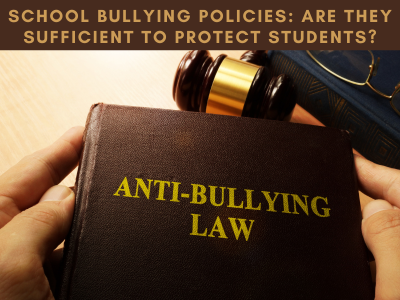Bullying in Ontario schools continues to be a pervasive issue, affecting the well-being and academic success of countless students. In response, schools have implemented bullying policies aimed at creating safe and inclusive environments. However, the question remains: Are these policies sufficient to protect students? Rogerson Law Group, a leading advocate for victims of bullying in Ontario schools, delves into this important matter.

School bullying policies are crucial
School bullying policies play a critical role in establishing guidelines and procedures for preventing and addressing bullying incidents. These policies typically outline definitions of bullying, provide guidance on reporting procedures, and specify disciplinary actions for offenders. While such policies demonstrate a commitment to addressing the issue, their effectiveness depends on several key factors.
One crucial aspect is the clarity and comprehensiveness of the policy. A well-drafted policy should clearly define bullying behaviors, including physical, verbal, and cyberbullying, to leave no room for misinterpretation. It should also outline reporting mechanisms, ensuring that students, parents, and staff members know how and to whom they can report incidents. By establishing clear reporting channels, schools can encourage victims and witnesses to come forward without fear of reprisal.
School Bullying Support & Response
Additionally, the response and support mechanisms provided by the policy are vital. Schools should have procedures in place for timely and thorough investigations into reported incidents, followed by appropriate disciplinary actions. Moreover, the policy should address the support and intervention strategies available to both victims and offenders. Counseling services, peer support programs, and conflict resolution initiatives can help address the root causes of bullying and foster empathy among students.
Ongoing Training for Staff to Prevent & Stop Bullying
Regular training and education for staff members is another essential aspect of an effective policy. Educators and administrators must be equipped with the knowledge and skills necessary to identify, prevent, and respond to bullying incidents. Training sessions can help staff members recognize the signs of bullying, implement preventative measures, and intervene effectively.
Furthermore, the involvement and collaboration of the entire school community are crucial. Parents, students, and staff should have opportunities to provide input and feedback on the policy. Creating a culture of inclusivity and respect requires the active participation of all stakeholders.
While school bullying policies are a step in the right direction, their effectiveness can vary. It is imperative to regularly evaluate and update these policies to ensure they remain relevant and responsive to the evolving nature of bullying. Rogerson Law Group, dedicated to fighting for the rights of bullying victims, encourages schools to seek legal guidance to strengthen their policies and ensure adequate protection for students.
In conclusion, school bullying policies play a vital role in safeguarding students. By providing clarity, support mechanisms, ongoing training, and community involvement, these policies can create safer and more inclusive educational environments.
Rogerson Law Group stands ready to assist schools in developing and strengthening their bullying policies, ultimately fostering a culture of respect, empathy, and protection for all students in Ontario schools.


